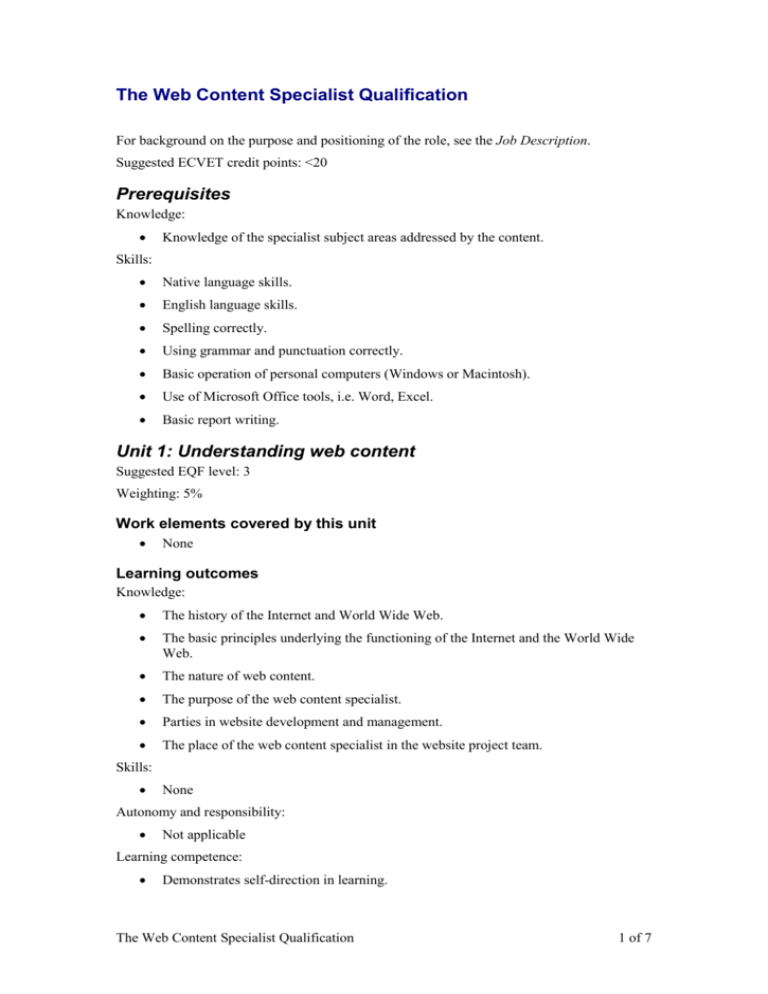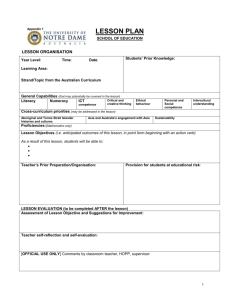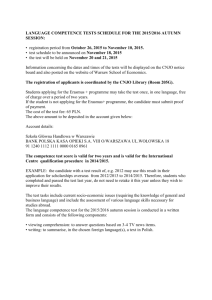The Web Content Specialist Qualification - ADAM
advertisement

The Web Content Specialist Qualification For background on the purpose and positioning of the role, see the Job Description. Suggested ECVET credit points: <20 Prerequisites Knowledge: Knowledge of the specialist subject areas addressed by the content. Skills: Native language skills. English language skills. Spelling correctly. Using grammar and punctuation correctly. Basic operation of personal computers (Windows or Macintosh). Use of Microsoft Office tools, i.e. Word, Excel. Basic report writing. Unit 1: Understanding web content Suggested EQF level: 3 Weighting: 5% Work elements covered by this unit None Learning outcomes Knowledge: The history of the Internet and World Wide Web. The basic principles underlying the functioning of the Internet and the World Wide Web. The nature of web content. The purpose of the web content specialist. Parties in website development and management. The place of the web content specialist in the website project team. Skills: None Autonomy and responsibility: Not applicable Learning competence: Demonstrates self-direction in learning. The Web Content Specialist Qualification 1 of 7 Communication and social competence: Not applicable Professional and vocational competence: Not applicable Unit 2: Website design and development Suggested EQF level: 3 Weighting: 10% Work elements covered by this unit Contribute to audience research as a basis for design of the site. Contribute to the top-level and detailed design of the website (or e-newsletter, etc.), with a particular focus on the ways in which the goals for the site and the needs of users can be met -through the provision of appropriate content. Contribute to the process of information design, to ensure that content is appropriately structured to meet the goals for the site and the needs of users. Contribute to documentation of the design. Contribute to the selection or design of appropriate content management software. Learning outcomes Knowledge: The role of the web content specialist as a contributor to the design process. Techniques for audience research. Effective practices in audience research. Elements in top-level and detailed website design. Key principles of information design. Key elements in design documentation. Principles underlying the design of content management systems. Required features of content management systems. Skills: None Autonomy and responsibility: Contributes to the process of design and development, without assuming overall responsibility. Learning competence: Demonstrates self-direction in learning. Communication and social competence: Uses communication skills to influence decisions of managers and specialists. Professional and vocational competence: Contributes to problem solving by integrating information from specialists. The Web Content Specialist Qualification 2 of 7 Unit 3: Managing web content Suggested EQF level: 4 Weighting: 15% Work elements covered by this unit Schedule the creation/acquisition of content in accordance with editorial policy. Allocate tasks to additional content contributors. Manage the creation/acquisition of content in accordance with the schedule. Manage costs within agreed budgets. Specify the multimedia content needed to support or work alongside textual content. Locate and select appropriate, existing multimedia content, including still images, animations, music and video. Liaise with multimedia specialists in the creation of any new multimedia content. Edit copy received from additional content contributors. Clear copyright for the use of any existing content. Learning outcomes Knowledge: Basic principles of project management. Alternative project management tools and methods. Cost elements in content creation/acquisition. The role of the web content specialist in editorial policy and in co-ordination and planning generally. The interaction of various content forms to grab the user’s attention and help the user to achieve their goals with the least effort. The particular strengths of still graphics, animations, audio and video for websites. The implications for production and delivery of using still graphics, animations, audio and video for websites. Accessibility implications for use of multimedia content. How multimedia content complements textual material. Sources for multimedia content. The production processes involved in developing multimedia content. Techniques for marking up content. Basic principles of copyright law. Situations in which copyright clearance is required. How to clear copyright. Skills: Operation of project management / scheduling tools. Selecting multimedia content in accordance with best practice principles. The Web Content Specialist Qualification 3 of 7 Applying content markup principles. Autonomy and responsibility: Responsible for implementation of editorial policy rather than its formation. Has some latitude in scheduling content creation/acquisition, in managing the work of additional content contributors and in working within agreed budgets. Supervises the work of other content contributors. Learning competence: Demonstrates self-direction in learning. Communication and social competence: Uses communication skills to gain commitment of other content contributors and multimedia specialists to the schedules and budgets. Uses communication skills to liaise effectively with multimedia specialists. Professional and vocational competence: Formulates responses to abstract and concrete problems. Unit 4: Creating web content Suggested EQF level: 5 or 6 Weighting: 40% Work elements covered by this unit Prepare textual content for websites (including feature articles, advertising copy, database content, links, FAQs, etc.). Prepare textual content for e-newsletters. Design web forms. Prepare textual content for distribution as SMS messages. Prepare scripts for audio voiceovers, for downloading from the site or distribution as ‘podcasts’. Learning outcomes Knowledge: Ethical and legal issues in content creation, including the basic principles of the laws of libel and slander, copyright law. The interaction of various content forms to grab the user’s attention and help the user to achieve their goals with the least effort. Knowledge of the specialist subject areas addressed by the content. Principles of effective writing for websites. Principles of effective writing for e-newsletters. Principles of effective form design. Principles of effective writing for SMS messages. Principles of effective writing for voiceover scripts. The Web Content Specialist Qualification 4 of 7 Skills: Planning and organising textual content. Using spell checkers. Using grammar checkers. Writing textual content for websites in accordance with best practice principles. Writing textual content for e-newsletters in accordance with best practice principles. Designing web forms in accordance with best practice principles. Writing textual content for SMS messages with best practice principles. Preparing voiceover scripts in accordance with best practice principles. Autonomy and responsibility: Responsible for completion of content creation tasks under guidance from website/project manager. Learning competence: Demonstrates self-direction in learning. Communication and social competence: Uses advanced skills of communication to generate content that achieves the goals of the website and meets the needs of users. Professional and vocational competence: Gathers and interprets data in a field in order to formulate effective content. Unit 5: Website promotion Suggested EQF level: 4 Weighting: 10% Work elements covered by this unit Use metadata and other methods to optimise search engine positions. Communicate with other site owners in order to maximise incoming links. Ensure the site is listed in relevant indexes and directories. Learning outcomes Knowledge: The importance of website promotion. The ways in which websites can be promoted. The nature and purpose of metadata. How search engines work. How incoming links affect search engine positions. How indexes and directories work. Skills: None The Web Content Specialist Qualification 5 of 7 Autonomy and responsibility: Responsible for promotional activities under guidance from website/project manager. Learning competence: Demonstrates self-direction in learning. Communication and social competence: None Professional and vocational competence: Contributes to problem solving by integrating information from specialists. Unit 6: Communicating with website users Suggested EQF level: 4 Weighting: 10% Work elements covered by this unit Respond to user enquiries, comments and suggestions. Moderate forums. Moderate chat sessions. Edit and/or approve content contributions made by users. Learning outcomes Knowledge: The importance of user communication. Ways in which user communication can be accomplished. How forums work. Principles of effective forum moderation. How chat rooms work. Principles of effective chat room moderation. Skills: Applying principles of effective forum moderation. Applying principles of effective chat room moderation. Autonomy and responsibility: Responsible for communication with users under guidance from website/project manager. Learning competence: Demonstrates self-direction in learning. Communication and social competence: Uses communication skills to relate effectively with users. Professional and vocational competence: Demonstrates the ability to interact within a complex environment. The Web Content Specialist Qualification 6 of 7 Unit 7: Web content maintenance and evaluation Suggested EQF level: Weighting: 10% Work elements covered by this unit Update and maintain time-sensitive material. Maintain menus, indexes and directories within the site. Archive and backup content (where this is not automatic). Conduct or commission ongoing audience research. Compile and analyse website usage statistics. Obtain and analyse user feedback. Recommend changes in editorial policy and site design. Learning outcomes Knowledge: The importance of content maintenance. How to backup content. The importance of evaluation. Techniques for audience research. Effective practices in audience research. Sources for usage statistics. How to analyse usage statistics. Skills: Using content backup software. Using software (such as Excel) to analyse usage statistics. Autonomy and responsibility: Responsible for content maintenance under guidance from website/project manager. Responsible for evaluation under guidance from website/project manager. Makes suggestions for improvements to outcomes. Learning competence: Demonstrates self-direction in learning. Communication and social competence: Uses communication skills to sell suggestions for improvements to managers/peers. Professional and vocational competence: Contributes to problem solving by integrating information from specialists. Formulates responses to abstract and concrete problems. The Web Content Specialist Qualification 7 of 7





